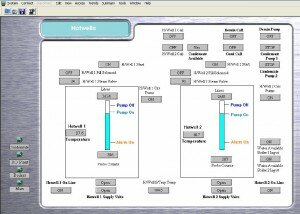Building Automation Systems don’t save energy
Tuesday, August 11th, 2009Building Automation Systems (BAS), otherwise known as Building Management Systems (BMS) or Direct Digital Control (DDC) systems don’t save energy. But their operators can.
A BAS system will often cost the equivalent of around one year’s worth of energy bills. But unless its well operated it may never pay itself off.
BAS systems are complicated. In this respect they are similar to a jet airplane. But unlike airline pilots, in far too many cases the operators of the BAS systems have little or no experience, minimal training, and often very little time to operate it.
You wouldn’t buy a jet airplane without having appropriately trained and experienced pilots to fly it. But far too often organisations buy BAS systems without making the necessary investment in the people who operate it.
Unlike airplane pilots, where serious mistakes can be fatal, if the BAS operator makes a mistake the chances are very few people, if any, will know about it. Your building won’t crash and burn if the operator manually over-rides a time schedule and leaves a large fan running all the time. (I haven’t seen a BAS system yet where fans that should be on a time schedule have had their schedule bypassed.)
In many organisations, with energy costs 1% of less of total operational expenditure, the chances are that the accountant won’t be watching to ensure that any savings put forward in the business case for installing the BAS are actually achieved. Usually the only thing that everyone will know about, and have an opinion on, is the temperature inside the building. In response to this many BAS operators do everything possible to keep the building at a temperature that generates the least amount of complaints, no matter what. In some cases the energy implication of this are like a pilot flying from Melbourne to Brisbane via Alice Springs to avoid a bit of turbulence, rather than making intelligent small deviations to the direct Melbourne – Brisbane route to minimise discomfort to passengers.
And if you’ve outsourced the management of your BAS, are you auditing the performance of your contractor? How do you know your BAS contractor is operating your building for high energy efficiency? The contractor doesn’t pay your energy bills – and again may end up with the sole focus of keeping the building at a temperature that minimises complaints, without necessarily considering the increased energy consumption that this may cause. One of our customers has us auditing their controls on a regular basis, and we rarely fail to identify valuable energy savings because of wastage caused by shortcuts taken by their contractors.
Also unlike in an aircraft, when an alarm is raised by the system, the chances are that it will be ignored. Particularly if there are dozens or even hundreds of alarms going off every day, which is the norm rather than the exception in larger BAS systems.
And unlike a new jet, the chances are that your brand new BAS system may not have been correctly commissioned. For example one or more sensors could be in the wrong position and thus giving erroneous readings. An example is a recent customer’s building where the building manager couldn’t figure out why the system was running on 100% outside air most the time. After a great deal of investigation it turned out that the CO2 sensor (air quality sensor) was positioned in a copier room which had no mechanical ventilation (another mistake), and was thus reading too high, with the result that the system was running on 100% fresh air - at huge energy cost - to try and reduce CO2 levels.
To get the most from you BAS system invest in the person who runs it. Make sure they know the principles of energy efficient HVAC and building operation. Make sure they are well trained in operating your system. Set energy performance targets, and monitor them. Make sure they have enough time to actively operate the system, and aren’t just spending all their time dealing with alarms. Bring in experts to help configure the system and review it on a regular basis if necessary. Or else outsource management, but with clear performance targets and regular audits if necessary. And then the investment in your BAS will result in energy savings.



